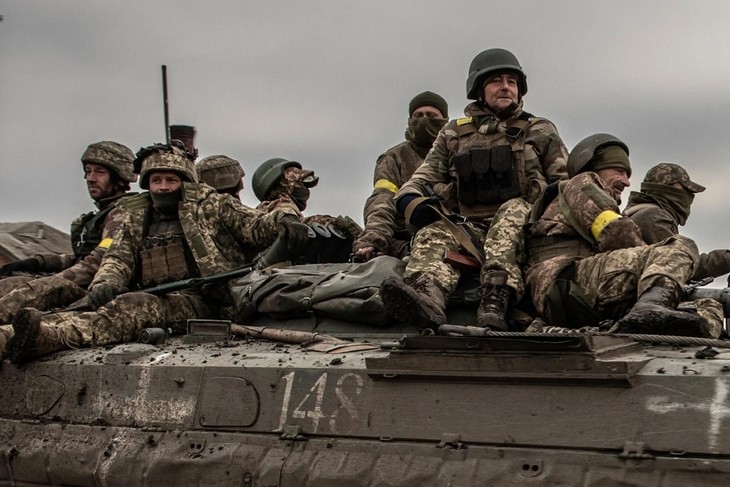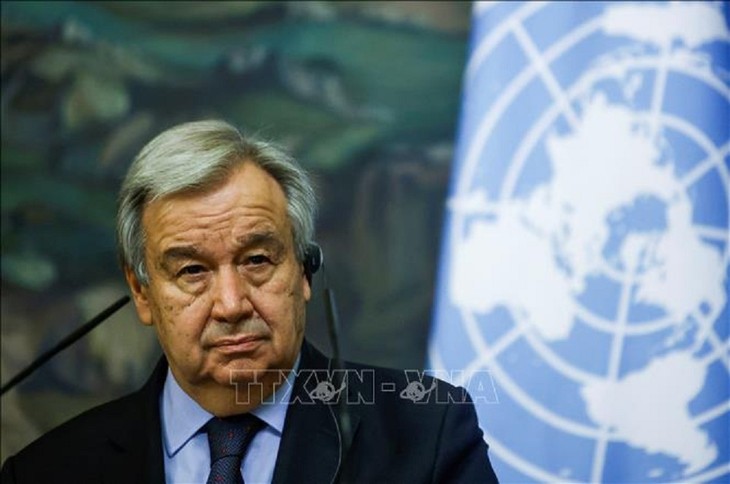(VOVWORLD) -The conflict between Russia and Ukraine has entered its third year. Hope for a diplomatic solution remains dim, increasing the risk of instability globally.
 Ukraine's soldiers on a military vehicle (Photo: New York Times) Ukraine's soldiers on a military vehicle (Photo: New York Times) |
On February 24, 2022, Russian President Vladimir Putin announced a "special military operation" in Ukraine, opening the largest military conflict in Europe since World War II.
Full-fledged confrontation
Since the Russia-Ukraine conflict began, its battlefield intensity has never decreased. No official figures are available, but military experts agree that hundreds of thousands of Russian and Ukrainian soldiers have been killed or injured. Damage to the economy, infrastructure, and national potential of both sides, but especially of Ukraine, cannot be calculated and will certainly increase as the conflict continues.
The conflict has profoundly changed the security environment in Europe and impacted many international relationships. Finland and Sweden have abandoned their decades-long policy of neutrality to join NATO.
European countries in NATO have sharply increased their defense spending, worried that the breakdown in Western relations with Russia has increased the risk of a direct confrontation. France, Germany, Sweden, Poland, Romania, and the three Baltic countries have all publicly mentioned the possibility of a conflict with Russia in the next few years.
This risk, along with the Hamas-Israel conflict in Gaza, and tensions in many other areas prompted UN Secretary General Antonio Guterres to issue a warning. “Today's global order is not working for everyone. In fact, I will go further and say it's not working for anyone. Our world is facing existential challenges, but the global community is more fragmented and divided than at any time during the past 75 years,” he said.
 UN Secretary General Antonio Guterres (Photo: AFP/VNA) UN Secretary General Antonio Guterres (Photo: AFP/VNA) |
At the present time, there are no signs that Russia, Ukraine, or the West will make concessions. Western countries have imposed 12 rounds of sanctions, totaling tens of thousands of individual sanctions, against Russia. But political, military, and economic pressure from the West has been unable to change Moscow's strategy. The Russian economy has held firm and grew 3.6% last year. On February 18, President Putin said Russia does not mind being cut off from all economic and energy relations with Europe.
“The smaller our dependence on energy the better because the Russian economy’s non-energy part is growing at a much faster rate than previously. It’s always like that, when it’s easy to get money, then you get addicted, when you need to think, then other mechanisms come into play. And they did start working for us. As for the EU, let them decide. If they decide they need Russia’s energy, they can have it. If not, we are fine with that,” said Putin.
Seeking a diplomatic solution
The confrontation between Russia and Ukraine and its Western allies contains little hope for a diplomatic solution. But most observers say diplomacy is the only option. At last week’s Munich Security Conference in Germany, Finish President Alexander Stubb said that conferences seeking peace in Ukraine, like the conference to be organized by Ukraine and Switzerland in March, need to be promoted, even without one of the involved parties. But he admitted that the West can’t unilaterally resolve the conflict in Ukraine.
“The key is to have countries like India, China, Saudi Arabia, Nigeria, South Africa, and Brazil involved. At some stages, we hope that Russia will come to the table as well,” said Stubb, added that “that only helps with international pressure. That international pressure has to come from somewhere else from the West, because we’re clearly chosen our side in the conflict.”
Current obstacles to a diplomatic solution come from many sides. Last year, Ukrainian President Volodymyr Zelensky signed a decree banning negotiations with Russia as long as President Putin is in power. Meanwhile, Russia has said it is always ready to negotiate but requires Ukraine and the West to accept "new territorial realities", which Ukraine firmly rejects.
Ulrich Bruckner, Professor of European Studies at Stanford University’s branch in Berlin, said the majority of Europeans perceive the Russia-Ukraine conflict as not just a territorial dispute between two countries but as a geopolitical war between Russia and the West.